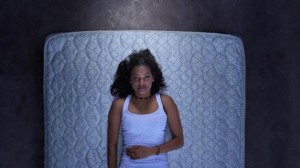theatre review: sugarland
On a recent dreary and wet weekend, I decided to venture out of the house to see a matinee showing of The Australian Theatre for Young People’s new play, Sugarland. The play, written by Rachael Coopes and Wayne Blair and directed by David Page and atyp’s Artistic Director Fraser Corfield, opened in late August (is still on this coming week) and has since received several rave reviews. I’m here to add another one to that list.
Opening on a stage strewn with ‘red dust’ and rustic small platforms and boxes, Sugarland takes you straight into its element – a glimpse into the lives of teenagers living in Katherine, NT. We meet Nina, beautifully played by Dubs Yunupingu, who is trying to leave home due to family violence. Nina explains in the opening monologue what Katherine and country truly mean to her. It is not a glossy brochure tourist town – it ‘is Katherine in all its sweaty, screwed-up, multicultural glory. And it sucks.’ It is a place and a lifestyle she knows all too well.
Nina then meets Erica, played by Elena Foreman, who does a fantastic job of becoming her character in full force – she is 100% rough on the surface and 100% soft on the inside. Erica has been moved to Katherine because she’s an RAAF kid. Nina and Erica bond over music, in particular Kanye West. We next meet Jimmy, who is Nina’s extremely troubled ‘cousin,’ played by Hunter Page-Lochard – an actor we should all keep our eyes on. In the mix as well are local boys Aaron (Narek Arman) and Charles (Michael Cameron), both played with exquisite precision and believability.
The kids receive help from Ms. Penny, a teacher, played by Rachael Coopes herself, who is doing her best to help out all the kids living in Katherine. They hope to compete and win in a Sing Search competition – which will give them money and the chance to get out of Katherine for a bit.
Coopes and Blair co-wrote the play after spending numerous residencies in Katherine. Their aim was to create a picture of teenage life ‘against a wider landscape of deep social dysfunction so sadly common in communities across Territory’ and although Coopes says she tried to ‘avoid writing a political play, it kind of ends up being one.’
And it’s true – at the core of Sugarland there are the numerous important issues that start to unravel themselves as we learn more and more about the characters. Suicide and self-harm being one of the most prevalent. We watch Jimmy teach Erica how to choke herself because he enjoys doing it to himself often, and although Nina disapproves and tells him to stop many times, he persists. Erica is also a self-harmer – she wears long sleeves in the boiling NT heat to hide the numerous scars on her forearms. These kids, only just in high school, are clearly battling depression and anxieties well beyond their years. This is confronting to see of course, but it really puts its foot down on how much these issues are affecting the youth of Australia (no matter what their ancestry is – Aboriginal or not). It makes an audience member think – if young kids are experiencing this much pain, then surely something needs to be done about it. Other political issues that arise include mentions of anxiety between the Aboriginal community and the white community, alcoholism, drug addiction, money and class issues, environmental concerns, and how the education system fails to treat students of numerous backgrounds with equality.
Sugarland concludes with Nina’s powerful story about an Aboriginal boy who cares for the river and doesn’t understand why it’s still muddy, even after the wet season. The boy finds an Aboriginal community on one side of the river, that is too busy gambling and drinking to do anything about the issue, and the tourist town on the other side that doesn’t seem to care either. The powerful and yet truthful message here is that issues such as a polluted river and an uncared-for environment leave everyone caught red-handed. Nina concludes by asking us ‘how are we going to fix country?’ And I answer – it is with plays such as this one, that don’t hold back the truth, that may help us to recognise that we need to start sewing up the wounds of Australia ourselves, instead of waiting around for others to do it for us.
Sugarland is showing until September 13. Tickets: $30


